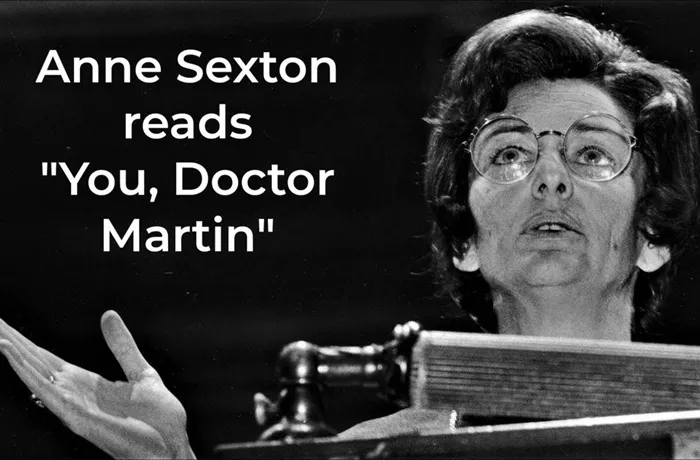Welcome to Poem of the Day – You, Doctor Martin by Anne Sexton
Anne Sexton, one of the most celebrated American poets of the 20th century, is known for her deeply personal and often confessional writing style. Her poem “You, Doctor Martin” explores themes of healing, transformation, and the complexities of human relationships. This article will offer a detailed explanation of the poem, breaking down its key elements and interpreting its meaning.
You, Doctor Martin Explanation
The Title and Context
The title, “You, Doctor Martin,” directly addresses a figure named “Doctor Martin,” who can be interpreted as a symbolic or literal representation of someone the speaker relies on. The term “Doctor” suggests that this figure may represent a healer, whether physically, emotionally, or psychologically. Sexton often wrote about the power dynamics in her relationships, and this poem may reflect her complex view of authority, vulnerability, and healing.
The Speaker’s Relationship with Doctor Martin
In the poem, the speaker seems to address Doctor Martin directly. The tone is both personal and pleading, with the speaker expressing a need for understanding and comfort. The reference to “Doctor Martin” could signify someone who has the ability to heal the speaker’s emotional pain or struggles. However, as with many of Sexton’s works, there is an underlying tension, as the speaker grapples with the expectations placed on Doctor Martin and the potential limitations of the healing process.
The use of “Doctor” may also highlight the distance between the speaker and Doctor Martin. The figure of the doctor is often seen as one who possesses knowledge and power, yet there is an inherent disconnect between the healer and the one being healed. This distance reflects the emotional divide that Sexton frequently explores in her poetry.
Themes of Healing and Vulnerability
One of the central themes of the poem is healing. The speaker appears to be in need of help, which is why they turn to Doctor Martin. This may represent not just physical healing, but emotional or psychological healing as well. Throughout the poem, the speaker hints at personal struggles and a longing to overcome these challenges.
However, the healing process is never straightforward. There are moments in the poem where the speaker questions whether healing is even possible. This uncertainty reflects Sexton’s often skeptical view of conventional therapy or external help. She was known to critique the limitations of the medical or psychological systems, which she saw as often inadequate in addressing deeper, existential issues.
Sexton’s Use of Language and Imagery
Anne Sexton’s language is poignant and sharp, capturing both the rawness of the speaker’s emotions and the complexities of their relationship with Doctor Martin. The imagery in the poem enhances the emotional weight of the words, offering a sense of both hope and despair. Sexton’s mastery of imagery allows the reader to feel the speaker’s pain and longing, making the poem both intimate and universally relatable.
Sexton uses vivid descriptions and metaphors to explore the tension between seeking help and feeling the sting of dependency. For example, the idea of the doctor as a figure of authority might suggest the speaker’s feelings of being small or insignificant in the face of overwhelming emotional or mental struggles.
Conclusion
In the final stanzas of “You, Doctor Martin,” there is an unresolved sense of uncertainty. The speaker’s plea for help may not be fully answered, or the answer may not be as clear or satisfying as they had hoped. This lack of resolution is typical of Sexton’s poetry, as she often leaves her poems open-ended, reflecting the complexity of real life. Healing, in Sexton’s world, is never simple, and the process is filled with both hope and disappointment.

